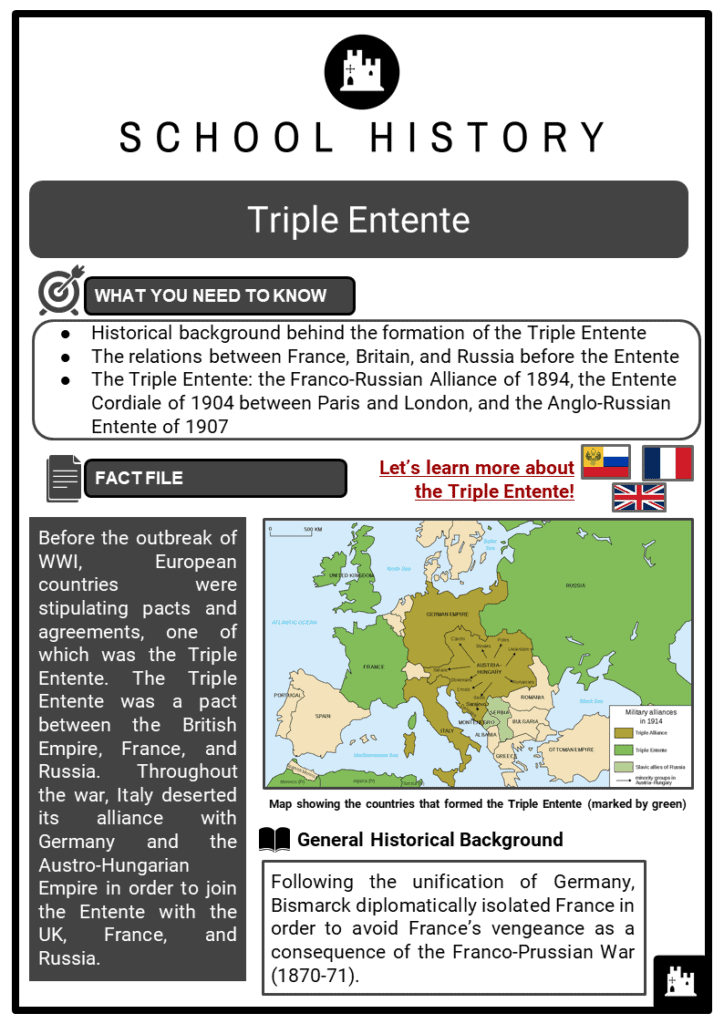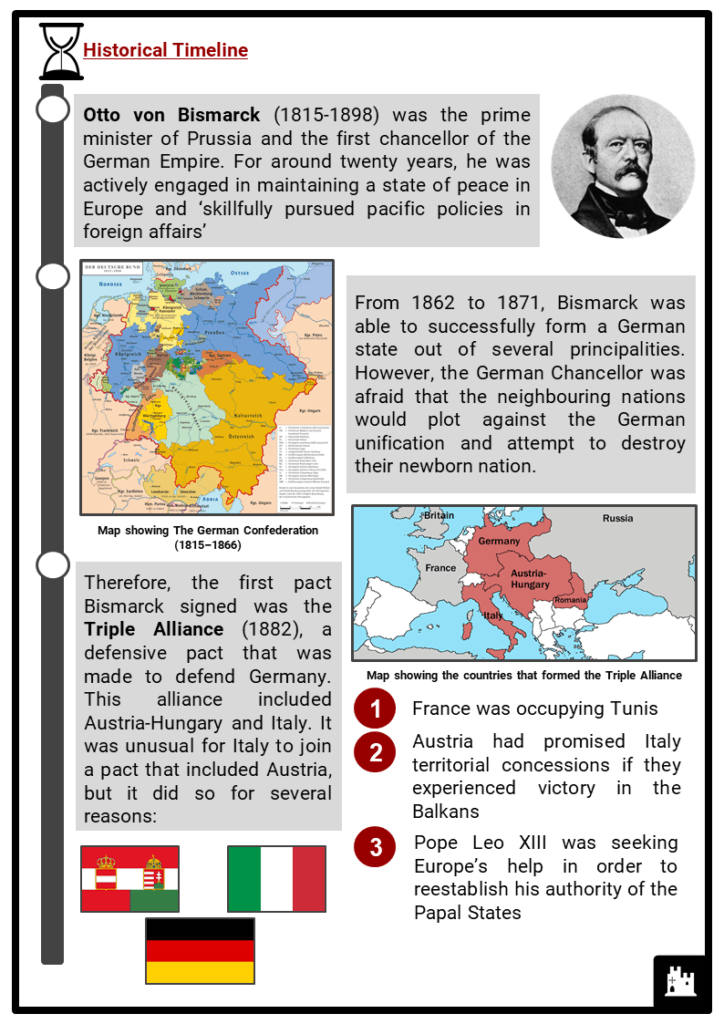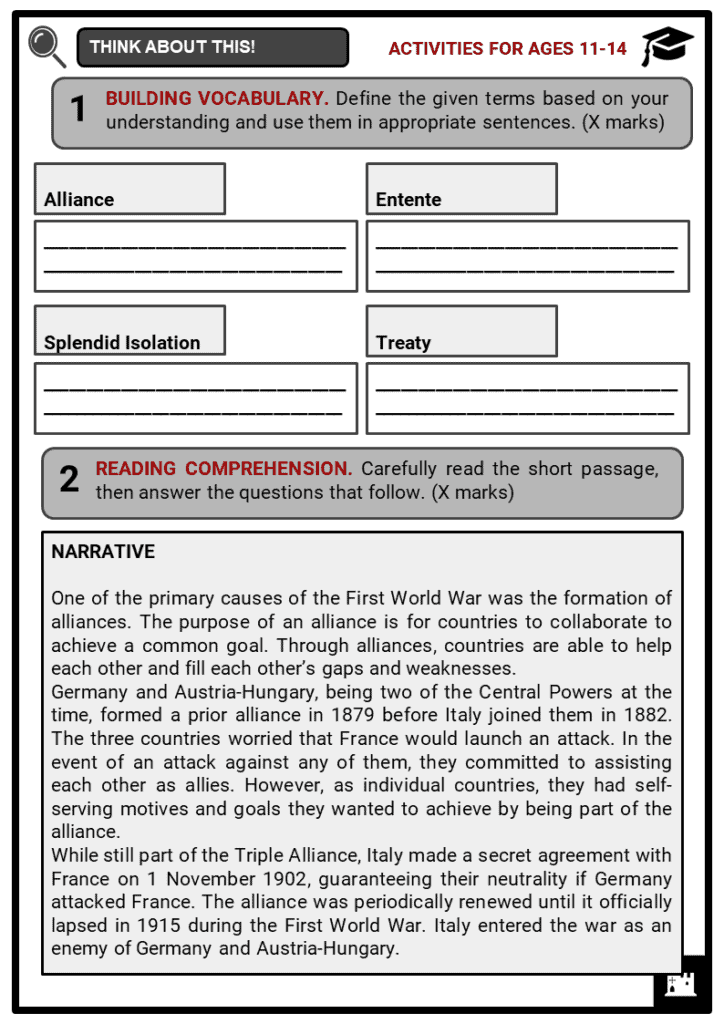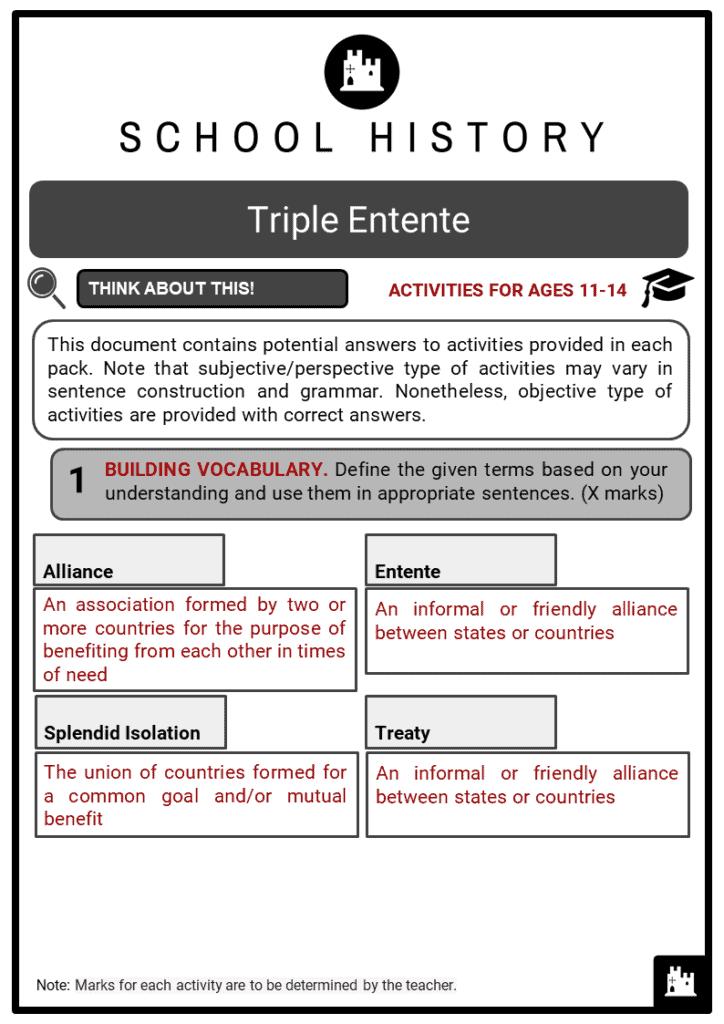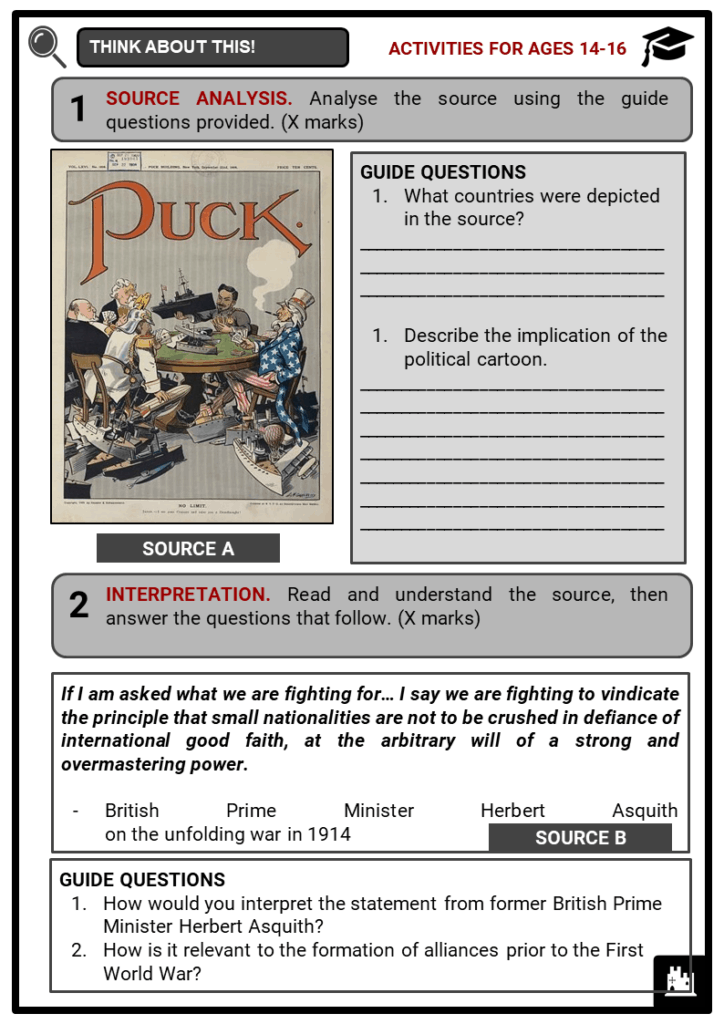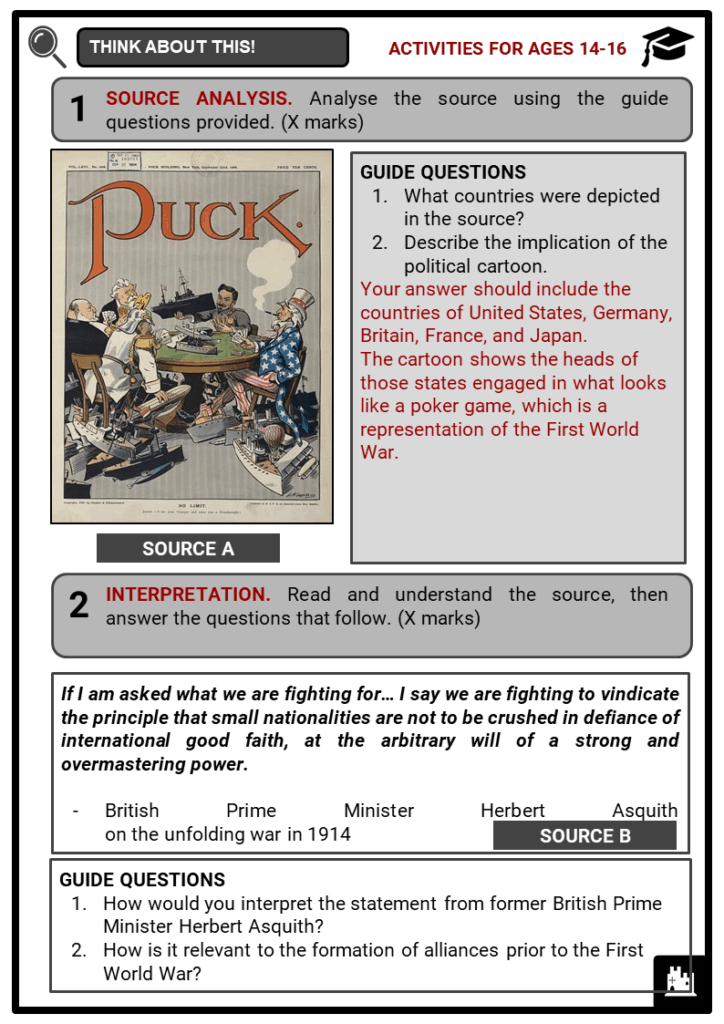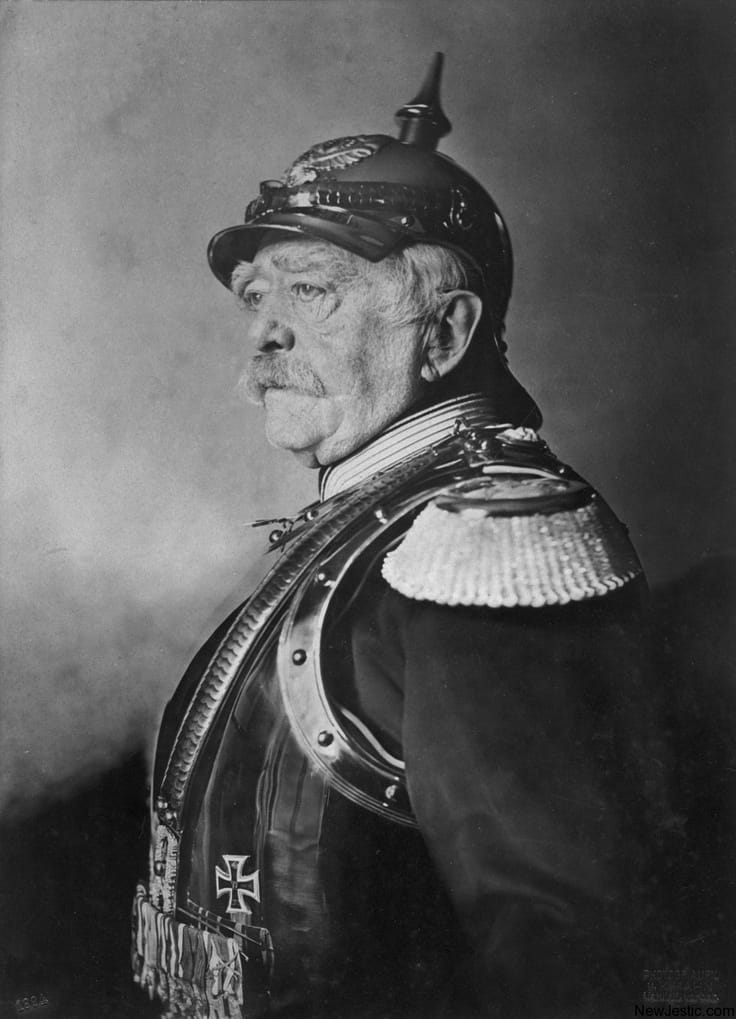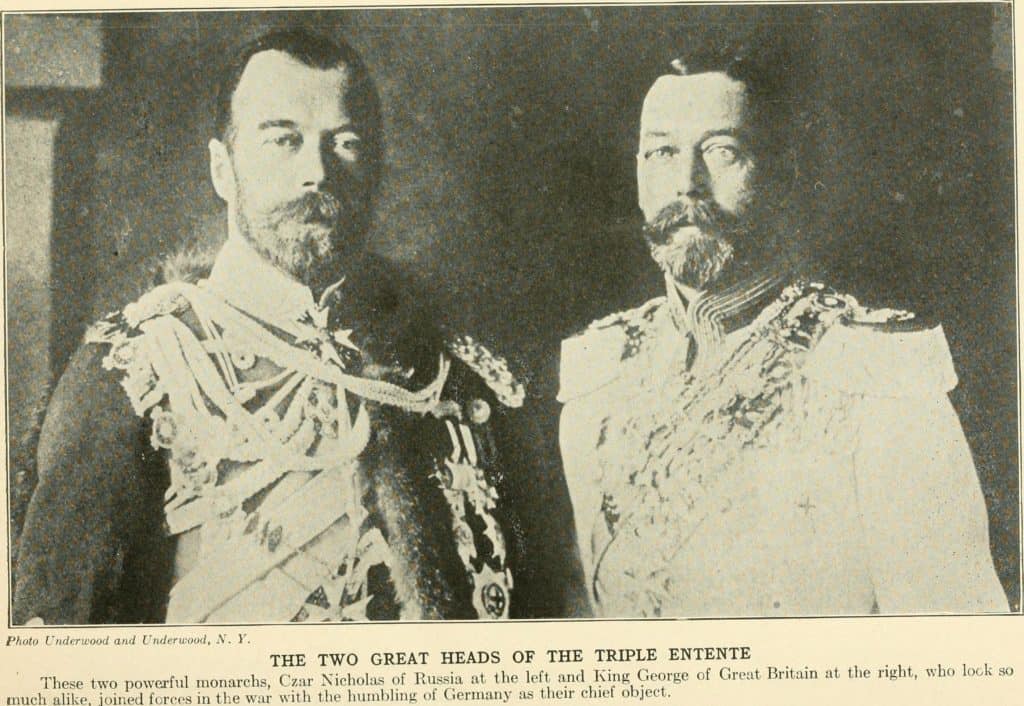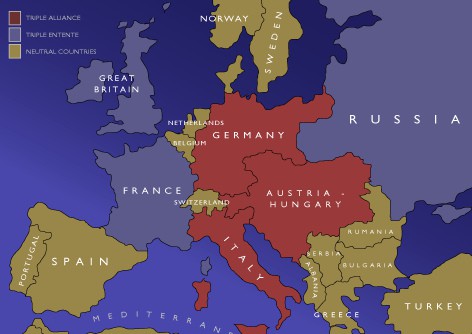Download Triple Entente Worksheets
Do you want to save dozens of hours in time? Get your evenings and weekends back? Be able to teach Triple Entente to your students?
Our worksheet bundle includes a fact file and printable worksheets and student activities. Perfect for both the classroom and homeschooling!
Table of Contents
Add a header to begin generating the table of contents
Summary
- Historical background behind the formation of the Triple Entente
- The relations between France, Britain, and Russia before the Entente
- The Triple Entente: the Franco-Russian Alliance of 1894, the Entente Cordiale of 1904 between Paris and London, and the Anglo-Russian Entente of 1907
Key Facts And Information
Let’s learn more about the Triple Entente!
- Before the outbreak of WWI, European countries were stipulating pacts and agreements, one of which was the Triple Entente. The Triple Entente was a pact between the British Empire, France, and Russia. Throughout the war, Italy deserted its alliance with Germany and the Austro-Hungarian Empire in order to join the Entente with the UK, France, and Russia.
General Historical Background
- Following the unification of Germany, Bismarck diplomatically isolated France in order to avoid France’s vengeance as a consequence of the Franco-Prussian War (1870-71).
Historical Timeline
- Otto von Bismarck (1815-1898) was the prime minister of Prussia and the first chancellor of the German Empire. For around twenty years, he was actively engaged in maintaining a state of peace in Europe and ‘skillfully pursued pacific policies in foreign affairs’
- From 1862 to 1871, Bismarck was able to successfully form a German state out of several principalities. However, the German Chancellor was afraid that the neighbouring nations would plot against the German unification and attempt to destroy their newborn nation.
- Therefore, the first pact Bismarck signed was the Triple Alliance (1882), a defensive pact that was made to defend Germany. This alliance included Austria-Hungary and Italy. It was unusual for Italy to join a pact that included Austria, but it did so for several reasons:
- France was occupying Tunis
- Austria had promised Italy territorial concessions if they experienced victory in the Balkans
- Pope Leo XIII was seeking Europe’s help in order to reestablish his authority of the Papal States
- Austria’s relation with Russia was tense because of the Balkans. During that time, Bismarck maintained the diplomatic pact between the countries and stipulated a secret agreement with the Russian Tsar Alexander III, which is known as the Reinsurance Treaty. This established that Germany would not join Austria in the event of an attack against Russia, and Russia would not join France in the event of an attack on Germany.
- Bismarck was removed from his post because a stronger desire for colonial expansion in Europe was rising. Also, Bismarck was too diplomatic for the German Foreign Policy, which wished to expand its domain across the continent.
- However, when Wilhelm II ascended to Russia’s throne, the Reinsurance Treaty was discarded by the new sovereign. In the meantime, the United Kingdom had requested an alliance with Germany, which was never achieved since Britain did not agree with their ideological and military goals.
- Due to Germany’s aggressive policies, France and Russia started collaborating with each other with simple agreements, and subsequently, in 1892, they established the Franco-Russian Alliance.
- France and Russia had the common goal of opposing Germany.
- Meanwhile, the British and the French signed the Entente Cordiale in 1904. When Russia joined in 1907, it became the Triple Entente.
- The Triple Entente developed mainly from the Franco-Russian Alliance of 1894, the Anglo-French Entente Cordiale of 1904, and the Anglo-Russian Convention of 1907.
- Before delving into the details of what the Entente is about, it is necessary to understand that treaties and alliances were being signed ‘between individual countries all over Europe’.
The Treaty Of London (1867)
- This treaty stated that Britain would intervene if Belgium’s neutrality during a European conflict was threatened.
Italy’s Secret Alliance
- Italy and France had secretly signed a pact of non-aggression on 1 November 1902, guaranteeing their neutrality if Germany attacked France. They were still part of the Triple Alliance when they did so.
Russia Agreed To Protect Serbia
- The Austria-Hungary government believed that Serbia and Bosnia worked together in the assassination of Archduke Franz Ferdinand. They viewed it as an attack on the Austro-Hungarian Empire. Austria-Hungary sent a formal letter to Serbia containing demands that Serbia refused to accept. This exchange constituted the July Crisis. Serbia was not willing to meet all their demands, causing Austria-Hungary to declare war. Russia mobilised its army in support of Serbia, while Germany declared war on Russia in support of Austria-Hungary. France mobilised to help its ally Russia, which led to Germany declaring war on France.
- All European nations were afraid of Germany’s expansionist ambitions. However, all the treaties mentioned would become devoid of any meaning in July 1914, when the First World War started in Europe.
- Throughout history, the three countries had been rivals for several different reasons, and – at times – for extended periods of time. For example...
- France and Russia had fought against each other during the Napoleonic wars and campaigns.
- France and Britain fought the Hundred Years’ War (and several other wars).
- Russia and Britain did not sympathise with Japan – who had won the war against Russia in 1904.
- Moreover, as all this competition was not sufficient, these countries had colonial ambitions and were striving to get control over the territories in Africa, Asia, and the Middle East. However, Russia, Britain, and France had not always been on friendly terms.
- It was Sir Edward Grey that instituted such an entente, which did not require any of the participants to go into war if one of the other members was attacked. Simply, they had the duty and ‘moral obligation to support each other’.
Triple Entente, 1907
- A decade before the First World War, on 8 April 1904, France and Britain ended their long-standing colonial disputes over territories in North Africa. The initial name of their agreement was a Declaration between the United Kingdom and France Respecting Egypt and Morocco. According to it, the two European powers should not ‘challenge’ the ‘British control over Egypt’ and guaranteed France the right to implement any government, economic, and military reforms in Morocco, as well as their right to ‘preserve order and to provide assistance’.
- France’s main reason for having diplomatic relations with Great Britain was its necessity to defend itself from Germany after its victory in the Franco-Prussian war.
- Britain’s reason for allying with the French originated in their fear of being attacked by Germany, which was developing an ambitious naval programme that threatened the British naval programme.
- Germany’s first attempt to break the British-French alliance was in March 1905, when the Germans sent Kaiser Wilhelm II to Morocco in order to support the sultan against the French government.
- However, such a move strengthened French control in the region, as during a conference held in Algeciras (Spain), France’s claims on the region were recognised.
- Yet, the situation was unresolved, and the clash between the two European powers caused the First Moroccan Crisis (1905) and the Second Moroccan Crisis (1911).
- It is no surprise that France and England only strengthened their alliance after witnessing Germany’s aggressive colonialist behaviours. For this reason, the Cordial Entente went from being a mere friendship to an informal military alliance. Later, it evolved into talks and an agreement with Russia.
- The situation during the Entente consisted of the British Empire, the Russian Empire, and France with its colonies, controlling a vast territory that summed up to 70 million km2. Therefore, their domain extended over half of the habitable territories of the world, which comprised a population of over 600 million people.
- In 1904, Britain and Russia thought it was time for France to exit the period of ‘splendid isolation’ that Bismarck’s Germany had placed her in. Therefore, France joined the Entente Cordiale (which means Friendly Agreement).
- Before Russia entered the agreement with the other two countries of the Entente, it is necessary to note that France and Russia had been opponents during the Crimean War (1853-1856).
- However, Russia also sought reassurance against the Germans, who were attracted by the idea of expanding towards the East. Russia was not only seeking to defend herself from potential conflicts, though. It also had to deal with major interior struggles. In fact, it was the most backward of European powers and was struggling with an oppressive economic system that caused resentment among the poor and peasant classes.
The Triple Entente During Wwi
- In 1914, Archduke Franz Ferdinand (the heir to the Habsburg throne and the Austro-Hungarian Empire) and his wife were assassinated by the Bosnian Serb, Gavrilo Princip.
- Pan-Slavic nationalism inspired the assassination of Archduke Franz Ferdinand in Sarajevo in June 1914. This major event led to the outbreak of the First World War.
- Although no one in Austria-Hungary’s government was particularly upset by Franz Ferdinand’s death, as he was not going to cause any constitutional problems from that moment on, the attack was nonetheless an excuse to start a war against Serbia.
- When the First World War started, Europe was divided in two powerful blocks. The United Kingdom, France, and Russia (also known as the Triple Entente) were opposing Germany, Austria-Hungary, and Italy (also known as the Triple Alliance). Italy had been a member of the Triple Alliance since 1882, but it ended up switching sides and joining the Triple Entente.
- The reason for such a switch included Italy’s ambiguous feelings towards the Austro-Hungarian Empire, which had conquered territories that previously belonged to Italy. Therefore Italian nationalists wanted to re-obtain them. Moreover, when Italy joined the Triple Alliance, not only did it claim to not want to enter any war against Great Britain, but it also made a secret pact with France in 1902, in which it stated it would not attack France under any circumstances.
- Britain’s policy of “splendid isolation” was a diplomatic practice of avoiding fixed alliances with other Great Powers in Europe. It was upheld from 1822 until its termination with the Entente Cordiale in 1904.
- However, in 1914, Italy decided to remain neutral on the basis that both Germany and Austria-Hungary had not been attacked. Rather, they had respectively attacked France and Serbia out of their own initiative.
- On 26 April 1915, Italy secretly signed the Treaty of London, which was an agreement with the Triple Entente that established Italy’s imminent attack on the Central Powers. Therefore, on 3 May 1915, Italy abandoned the Triple Alliance; and on 23 May 1915, they declared war on the Austro-Hungarian Empire.
Image sources
[1.] https://upload.wikimedia.org/wikipedia/commons/1/1b/Otto_Von_Bismarck.jpg
[3.] https://c1.staticflickr.com/5/4004/4639127699_dbc9a37b7d.jpg

